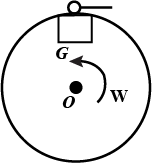Question
Question: A horizontal turntable in the form of a disc of radius r carries a gun at G and rotates with angular...
A horizontal turntable in the form of a disc of radius r carries a gun at G and rotates with angular velocity ωo about a vertical axis passing through the centre O. The increase in angular velocity of the system if the gun fires a bullet of mass m with tangential velocity v with respect to the gun is: (moment of inertia of gun + table about O is Io)

A) Io+mr2mvr
B) Io2mvr
C) 2rv
D) None
Solution
Here the net initial angular momentum will be the angular moment of the table Ioωo in addition to the angular momentum of the disc which is mr2ωo. Similarly, we can write the net final angular momentum. Compare the two momentum by applying conservation of angular momentum (as net external force is zero).
Complete step by step solution:
Here on the system the net external force acting on the system is zero so we can apply conservation of momentum.
The initial moment would be:
Pi=(Io+mr2)ωok;
Here:
Pi= Initial Momentum;
Io= Moment of inertia.
m = Mass;
r = radius;
ωo= Angular velocity.
Similarly, the final moment of inertia is given as:
Pf=Ioωk+mv′r(−k)
Now,
vBP=vBG−vPG ;
⇒v(i)=v′(i)−(−ωr)i …(here: vBP=v(i);vBG=v′(i); vPG=(−ωr)i )
Write the above equation in terms of v’:
⇒v(i)−(ωr)i=v′(i);
⇒v′=v−ωr;
Put the above in the equation for final momentum:
Pf=Ioωk+mv′r(−k);
⇒Pf=Ioωk+m(v−ωr)r(−k);
Now, apply conservation of angular momentum and equate final and initial momentum together.
(Io+mr2)ωok=Ioωk+m(v−ωr)r(−k);
Cancel out the common:
⇒(Io+mr2)ωo=Ioω−m(v−ωr)r;
Write the above equation in terms of ω,
⇒(Io+mr2)ωo=Ioω+mωr2−mvr;
Take the common out:
⇒(Io+mr2)ωo+mvr=ω(Io+mr2);
⇒(Io+mr2)(Io+mr2)ωo+mvr=ω;
Now, we calculate the change in angular velocity which is given as:
Δω=ω−ωo;
Put in the given value in the above equation:
Δω=((Io+mr2)(Io+mr2)ωo+mvr)−ωo;
Take LCM and solve:
⇒Δω=((Io+mr2)(Io+mr2)ωo+mvr−(Io+mr2)ωo);
⇒Δω=((Io+mr2)mvr);
Final Answer: Option “A” is correct. The increase in angular velocity of the system if the gun fires a bullet of mass m with tangential velocity v with respect to the gun isΔω=((Io+mr2)mvr).
Note: Here, the change in the angular velocity would be the final angular velocity minus the initial angular velocity. In the final angular momentum, the velocity of bullet w.r.t to the disc would be equal to the velocity of bullet w.r.t ground minus the velocity of disc w.r.t ground.
